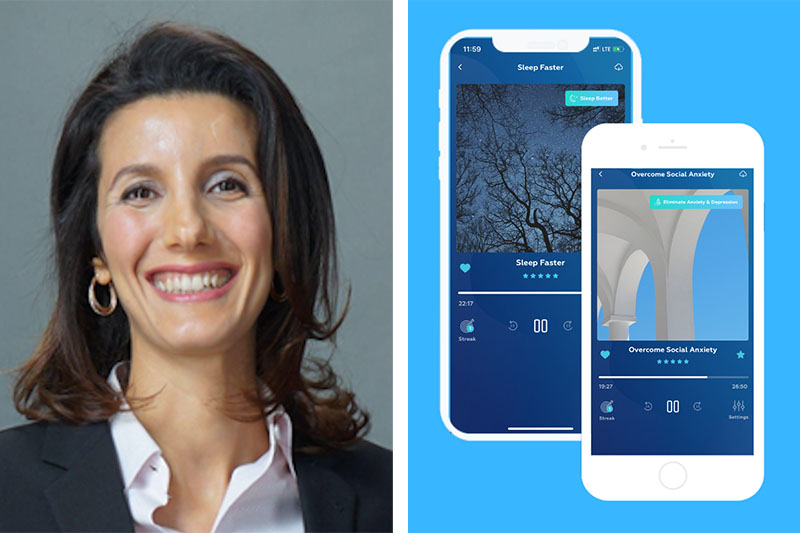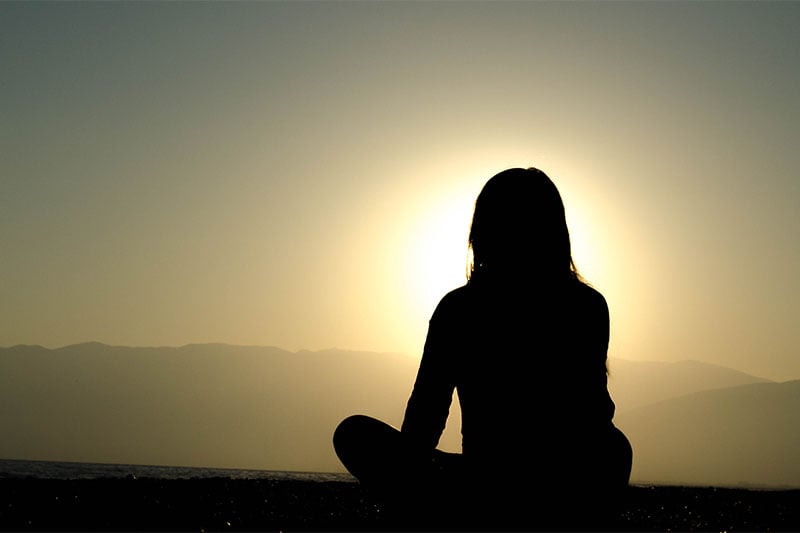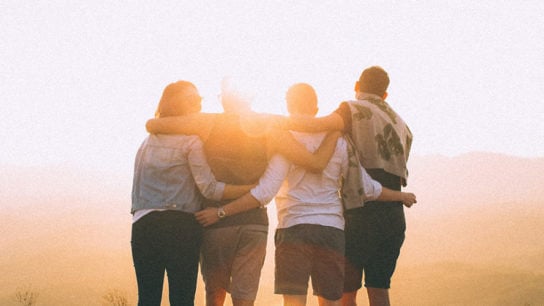Hypnotherapy app UpNow is part of a wider technology movement changing the way people are taking care of their mental health. We speak to certified hypnotherapist and UpNow founder Christine Deschemin to learn more about the benefits of these apps – and their limitations.
From political upheaval to a full-blown pandemic, the level of turmoil and uncertainty this year has taken a heavy toll on people’s mental health all around the world. In fact, research shows that two out of every three people are currently experiencing mental health issues, with 37% even showing symptoms of severe mental health conditions.
Seeking to make access to mental health aids both affordable and easy, Christine Deschemin, a certified hypnotherapist and founder of the Renewed Edge hypnotherapy centre, launched hypnotherapy app UpNow in March 2020. Positioned to be Asia’s first-ever self-hypnosis app, UpNow aims to use hypnosis to enable people to effectively leverage their mind, relieve stress and anxiety, boost performance, and – most importantly – improve both their physical and their mental health.
Here, we talk to Christine to find out more about self-hypnosis and reflect on the benefits and limitations of self-help apps currently on the market.

What exactly are hypnotherapy and self-hypnosis?
Hypnotherapy is a form of therapy that uses a set of techniques called hypnosis. It guides you to a state of heightened awareness so that you can partner with and leverage your mind to bring about the changes you want. The only difference between hypnotherapy and self-hypnosis is that in hypnotherapy, a hypnotherapist guides their client into a state of hypnosis, whereas for self-hypnosis, you re-create this natural state by yourself.
Any particular reasons for you to introduce a self-hypnosis app?
When we look at the statistics, 90% of people experience stress at work. That is a big, big percentage. In addition, two out of three people experience mental health problems and 37% experience symptoms of poor mental health. COVID-19 and protests have exacerbated stress levels. This has proved to be detrimental for mental health and physical health – in Hong Kong, for example, 51% of people suffer from insomnia.
This statistic is extremely alarming because sleep is a necessity, not a luxury. In times of increased automation, the mind is probably the most valuable resource anyone has. We need to be more creative than ever and we need to deal with more uncertainty. But, to fully unleash our creativity, we have to be able to manage the stress that comes with uncertainty. Without sleep, you simply can’t function, think, or be creative. For children, the lack of sleep can also impair their learning ability. So, I wanted to provide a tool that helps people cope with these difficulties, especially in Hong Kong where there is a dearth of therapists. People deserve to be helped wherever they are.
What are the benefits of hypnosis?
Our health is the result of small habits we have – these habits are what constitute our lifestyle. Hypnosis helps you kick bad habits, adopt new positive habits, and overall have a better lifestyle. It helps you gain a growth mindset as compared to a fixed mindset which can make you feel happier, calmer, and more productive. As a result, you can then achieve peak performance, manage pain, and even progress your career.
I have a wide range of clients with a wide range of needs, including stress and anxiety; professionals experiencing a lack of confidence and fear of public speaking; athletes looking to get rid of micro-doubts that prevent them from making decisions quickly; pregnant mothers preparing for birth; smokers and drinkers keen to quit bad habits.
Additionally, research shows that hypnosis can help alleviate irritable bowel syndrome (IBS) and also help people recover from burnout. Meditation cannot do any of this.
How effective is hypnosis?
Hypnosis is extremely effective when compared to other kinds of therapy. There was a study comparing psychoanalysis with hypnosis and the numbers in the study are really telling of how effective hypnosis is. 600 sessions of psychoanalysis achieved around a 38% success rate, so two out of three people were still left out even after years of therapy. Hypnosis, on the other hand, had a 93% success rate with only 6 sessions.

Is hypnosis safe?
There are a lot of misconceptions that hypnosis is an act of brainwashing, that hypnotherapists are able to control people’s minds, but these are not true and have only been made up by Hollywood movies. It’s actually very safe. Hypnotherapy is approved by many medical and psychological associations in the world. People are completely aware of what is happening and can’t be made to do anything against their will. In fact, the state of hypnosis is completely natural, and you actually experience this state many times during the day. Take highway hypnosis as an example, a person can drive a car responding to external events in a safe manner or pass by a place with no recollection of having consciously done so because they were in a state of focused attention; or, you may be reading a book and not realise an hour has passed. With hypnotherapy and guided therapy, I’m simply guiding you to create that state of focused awareness for yourself so you can harness the power of your mind to make the changes you want to make.
It will also shock you to know that hypnosis is one of the oldest forms of therapy and is often used in operating theatres. Some patients may not use anaesthesia during surgery because it can be unsafe: they are either too old or anaesthesia is not recommended for them. Hypnosis is used because it is effective, safe, and less expensive – you don’t have to worry about having something injected into your body that takes days to be drained out.
What is the difference between UpNow and other meditation and mindfulness apps currently on the market?
My app provides hypnotherapy, which is a form of treatment approved by many psychological and medical institutions. The other apps focus on meditation and mindfulness which are not forms of treatment. To me, meditation and mindfulness are only subsets of hypnosis. A lot of people have been practising mindfulness and meditation as a way to escape reality and relieve stress. I’ve seen people doing yoga twice a day or practising meditation multiple times a day, but this is actually unhealthy because they are using meditation and yoga as crutches. The problem is more profound and requires actual treatment.
What is the value of self-hypnosis apps? Do you think they can ever replace an actual hypnotherapy session?
Being able to access these self-hypnosis audios from your phone means that you’ll be able to do it within the safety and confidentiality of your own home. You don’t have to wait for an appointment before you receive help. There aren’t enough therapists in Hong Kong and there are only so many people I can see in a day. You can also easily listen to them when you are travelling, so this tool can be used by anyone at any time anywhere.
The app is also great in the sense that the audio downloads cover common and widespread issues. I designed the app as the first step to address mental health issues. There may be cases when there is no available hypnosis download for a particular topic. We always take feedback and add new audios. In the meantime, you will need to seek help with an in-person or online hypnotherapy session.
Do you have any self-help tips for people who are facing mental health problems?
A good self-care routine is very important. You should really pay attention to your mental health and how you are feeling every single day, not just when you are facing a challenge. Prevention is key.
I think sleep is the first thing to pay attention to. There is a very interesting book called Why We Sleep by a sleep specialist called Matthew Walker, and he talks about how sleeping pills only provide anaesthesia and do not really help you sleep, so it is important to find natural ways to sleep. You can try doing that by developing a sleep routine and making yourself calmer. Dimming the lights, staying away from the screen – because blue light interferes with your sleep, and staying away from social media and the news an hour or so before you go to bed will help. Learn to engage in self-hypnosis. Like any skills, you become better at it with practice. With consistent use, you reap more benefits.
Related Articles
One Man’s Journey: Changing How We Talk About Men’s Mental Health
Female Tech Founder Builds Thailand’s First Mental Health App, Reaches 63,000 People
Mind Medicine Australia: Could Psychedelics Solve Our Mental Health Crisis?





